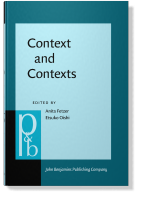Citation:

Abstract:
This paper explores the role of meso- and macro-context in the interpretation of text, on the basis of our research on the text of Greek laws. The use of the grammatical categories of tense, aspect and modality in these texts deviates from everyday use (Panaretou 2005, Moser and Panaretou 2009).
The study is based on a comparison of native speakers’ judgements (elicited through questionnaires and interviews and subjected to qualitative analysis) on law texts and everyday contexts containing the performance of the same type of speech act as the law: a mother setting a rule for her children and delineating the consequences of breaking this rule. Uses judged unanimously as ungram- matical and unacceptable in the latter context went unnoticed in law texts.
Our conclusion is that what licenses deviant uses is not the type of speech act, but the genre of law texts; it is argued that, as a form of meso-context, the genre of law texts, by virtue of being highly institutionalized within the cognitive and socio-cultural context in which it is embedded (Fetzer 2004, 2007), creates a cognitive frame so powerful as to impose specific interpretations even to grammatical forms which would be unacceptable in different (con)texts.

